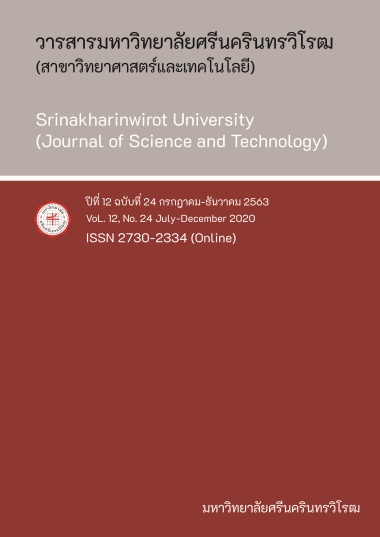ความสัมพันธ์ระหว่างสุขภาวะด้านจิตวิญญาณของพยาบาลและการดูแลผู้ป่วย ด้านจิตวิญญาณ THE RELATIONSHIP BETWEEN NURSE’ SPIRITUAL WELL-BEING AND THEIR SPIRITUAL CARE
Keywords:
Spiritual well-being, Spiritual care, Spiritual, Well-beingAbstract
The nurse’ spiritual well-being is very important. Because it affects the care of patients, That is, having a good spirit results in the nurse being aware of the spiritual needs of the patient. Making it possible to take care of patients in the spiritual dimension well. The purpose of this study were to examine predictors of spiritual well-being on their spiritual care. The assessments included a spiritual well-being questionnaire on 5 level rating scale, consisting of 3 parts: general information, spiritual health of nurses, CVI equal to 0.940, confidence value equal to 0.925, and spiritual care, CVI equal to 0.88, confidence value 0.940. One hundred and twenty-two nurses from Panyananthaphikkhu Chonprathan Medical Center Srinakharinwirot University were recruited. Data analysis using linear regression and analysis of variance.
The results revealed that most of the sample groups were female, 95.9%, single status 63.1%, Buddhism 95.9%, graduated bachelor degree 92.6%, age from 22-60 years old, mostly age 26-30 years, 32%. Work experience found that most of the work from 1-41 years old, most of the work is over 10 years, accounting for 42.6%, followed by the group of workers age 1-5 years, accounting 35.2%. Workplaces found that most of them work in General ward, 41.8%, followed by those work in intensive care units accounting for 24.6%. The sample reported having moderate level of spiritual well-being, 3.888 (S.D. = 0.435 and their spiritual care was at a moderate level, 3.172 (S.D. = 0.601). The relationship between nurse’ spiritual well-being and their spiritual care it was found that only the 3rd element, meaningful life could explain the spiritual care significantly .05 (p-value = .012), by explaining for spiritual care by 5.1 percent. In addition, the experience of caring for family members who were in the end of life had resulted in the nurse’ spiritual well-being were significantly different at the level of .05 (p-value = .035.
Conclusion: The third element of the nurse’ spiritual well-being is having a meaningful life. There was a significant positive correlation with the spiritual care for patients.
Downloads
References
[2] Information Technology Division National Cancer Institute. (2561). Hospital Based Cancer Registry 2560. Bangkok: Pornsup Printing Co., LTD. Retrieved November 15, 2018, from http://www.nci.go.th/th/File_download/Nci%20Cancer%20Registry/HOSPITAL-BASED%202018%20Revise%204%20Final.pdf
[3] Bureau of Non Communicable Disease. (2015). Annual Report 2015. Bangkok: WVO officer of printing mill. Retrieved November 15, 2018, from http://thaincd.com/document/file/
download/paper-manual/Annual-report-2015.pdf
[4] Bureau of Non Communicable Disease. (2019). Number and death rate of non-communicable diseases Year 2016 - 2017. Retrieved April 25, 2019, from http://www.thaincd.com/2016/mission/documents-detail.php?id=13486&tid=32&gid=1-020
[5] Suwakon K., Patcharee N., & Suvirita S. (2013). Palliative care: New dimension challenges the role of nurses. Srimahasarakham Nursing College Praboromrajchanok Instutute. Retrieved November 22, 2017, from http://www.smnc.ac.th/group/research/images/stories/end%20of%20life.pdf
[6] Yensamer, O., Yodchai, K., & Thaniwatananont, P. (2560). Spiritual care needs and spiritual care received among patients with end stage renal disease receiving hemodialysis. Journal of Nursing Science & Health, 40(2), 55-64.
[7] DeKoninck B., Hawkins LA., Fyke JP., Neal T., & Currier K. (2016). Spiritual care practices of advanced practice nurses: a multinational study. The Journal for Nurse Practitioners, 12(8), 536-44.
[8] Taylor, E. J. (2008). What is spiritual care in nursing? Findings from an exercise in content validity. Holistic Nursing Practice, 22(3), 154-159.
[9] Chiang, Y.-C., Lee, H.-C., Chu, T.-L., Han, C.-Y., & Hsiao, Y.-C. (2016, June). The impact of nurses’ spiritual health on their attitudes toward spiritual care, professional commitment, and caring. Nursing Outlook, 64(3), 215-224.
[10] Saengsakorn, P., Choochom, O., & Boonprakob, P. (2012). The Synthesis of Body of Knowledge related to Spiritual Well-Being in the Context of Thai Society. Journal of Behavioral Science, 18(1), 84-94.
[11] Chopradit, P., & Traisaeng, A. (2013). Spiritual Nealth of Nursing Students in Nursing Colleges Under the Jurisdiction of Praboromarajchanok Institute the Ministry of Poblic Health. Proceeding in The 5th International HR conference. Chon Buri: Burapha University.
[12] Azarsa, T., Davoodi, A., Markani, A. K., Gahramanian, A., & Vargaeei, A. (2015). Spiritual wellbeing, attitude toward spiritual care and its relationship with spiritual care competence among critical care nurses. Journal of caring sciences, 4(4), 309.
[13] Tongprateep, T. (2002). Spiritual Nursing and Nursing Process. Thai Journal of Nursing Council, 17(1), 1-12.
[14] Fang CK., Li PY., Lai ML., Lin MH., Bridge DT., & Chen HW. (2011). Establishing a ‘physician's spiritual well-being scale’and testing its reliability and validity. Journal of medical ethics,37, 6-12.
[15] Hair, J. F., Black, W. C., Babin, B. J., & Anderson, R. E. (2014). Multivariate data analysis: Pearson new international edition. Essex: Pearson Education Limited. p. 172.
[16] Yaowaboot, H. (2012). A Study of the Relationship between the Motivation on Self Development and the Self-Esteem of Professional Nurses. Master Project. Srinakharinwirot University.
[17] Supamanee, T., Kunaviktikul, W., & Keitlertnapha, P. (2014). Nurses’ Extended Work Hours and Nurse Outcomes in Community Hospitals. Nursing Journal, 41, 48-58.
[18] Panphadung, S., Nilmanut, K., & Kitrungrote, L. (2013). Spiritual Well-Being of Family Caregivers of Hospitalized Patients with Advanced Gynecological Cancer. The 4th Hatyai National Conference. Retrieved July 3, 2019, from http://www.hu.ac.th/conference/conference2013/Proceedings2013/pdf/Book1/Describe6/733_195-204.pdf
[19] Taylor EJ., Mamier I., Ricci-Allegra P., & Foith J. (2017). Self-reported frequency of nurse-provided spiritual care. Applied Nursing Research, 35, 30-35.
[20] Soowit, B., & Thummak, S. (2014). The Relationships among Perception, Attitude, and Nursing Practice, Applying the Buddhist Principle in Spiritual Care for Palliative Care Patients in Faculty of Medicine Vajira Hospital, Navamindrachiraj University. Kuakarun Journal, 21(1), 178-194.
[21] Pattrapakdikul, U., Chunuan, S., & Sunthornwipat, M. (2010). Spiritual Care for Hospitalized Patients with Chronic Illness. Thai Journal of Nursing Council, 25(1), 100-111.
[22] Wu, L. F., Tseng, H. C., & Liao, Y. C. (2016). Nurse education and willingness to provide spiritual care. Nurse education today, 38, 36-41.
Downloads
Published
How to Cite
Issue
Section
License
Srinakharinwirot University Journal of Sciences and Technology is licensed Under a Creative Commons Attribution-NonCommercial-NoDerivs 4.0 International (CC-BY-NC-ND 4.0) License, Unless Otherwise Stated. Please Read Journal Policies Page for More Information on Open Access, Copyright and Permissions.



